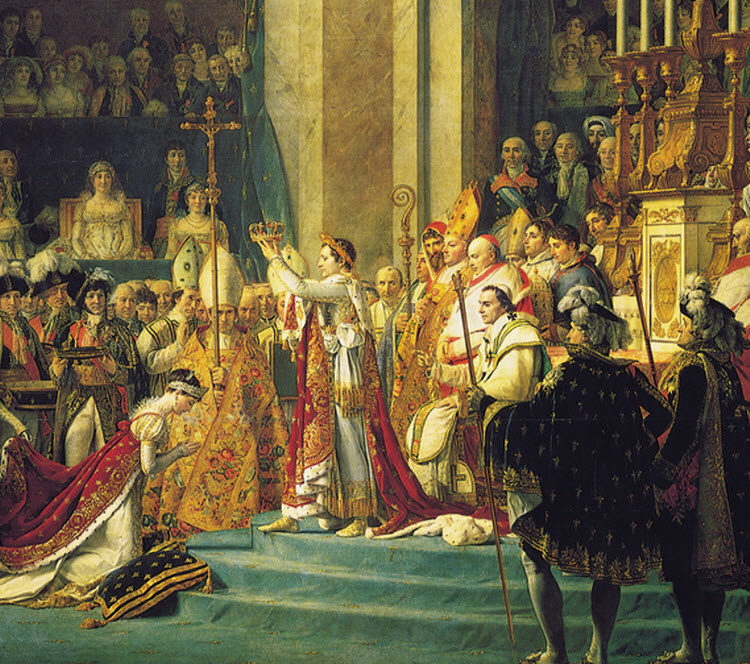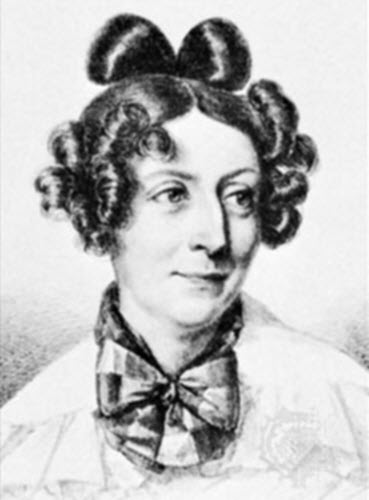Napoleon is Crowned Emperor
The Elaborate Ceremony as Described by an Eyewitness to History
Napoleon is Crowned Emperor
In 1804 Napoleon dropped any pretense of being just the First Consul, that is the leading minister of a republican France. Napoleon was at the peak of his success; his territories spanned most of Europe. And so it was fitting that his title should reflect the reality of his position. Napoleon proclaimed himself Emperor and persuaded or forced the Pope to crown him Emperor, and his first wife Empress. The ceremony took place in the presence of the elite of France and Europe and was a gala affair.
Below is a vivid first hand account of Napoleon's coronation written by Laure Junot, Duchess of Abrantes (6 November 1784 – 7 June 1838), who was one of the guests at the splendid ceremony. The Duchess of Abrantes was the wife of the French General Jean-Andoche Junot. She was a writer, extravagant spender, and prominent socialite in French society, known for her caustic wit and sarcasm which was often directed at Napoleon. Napoleon for the most part tolerated her criticisms, calling her petite peste ("little pest"). Napoleon's tolerance for Abrantes may be rooted in the fact that he had supposedly once proposed marriage to Abrantes' mother.
Abrantes accompanied her husband on his campaigns to Portugal and Spain during the Peninsular War. Junot later developed a mental illness and she returned to Paris. There she incurred the disfavour of Napoleon due to her ill advised criticisms of the Emperor, and for participating in intrigues with his opponents.
After Napoleon's first abdication she sided with the restored Bourbon king and did not go back to Napoleon's side after the Emperor's escape from Elba.
In 1828 she became the lover of the French writer Honore de Balzac, who helped supervise the writing of her Memoirs (published in 18 volumes between 1831 and 1834. The Memoirs provide a very vivid and interesting account of life during the Napoleonic era, though they are often coloured by spiteful comments about her rivals. She died in poverty in a nursing home at the age of 56.
One of the interesting details recounted by Abrantes was that Napoleon at the last instant took the crown from the hands of the Pope and placed it on his head himself, rather than follow tradition and have the Pope crown him. It is said that this was Napoleon's way of symbolizing the fact that he would not be subject to the authority of the Church. While that may have been the motive, it is unlikely that this was a spontaneous or unexpected decision. The act of placing the crown on his own head had likely been worked out and rehearsed before the ceremony.
The Duchess of Abrantes Attends the Coronation of Napoleon and Josephine

The Duchess of Abrantes
Before day-break, on the 2d of December, 1804, all Paris was alive and in motion; indeed, hundreds of persons had remained up the whole of the night Many ladies had the courage to get their hair dressed at two o’ clock in the morning, and then sat quietly in their chairs, until the time arrived for arranging the other parts of their toilette. We were all very much hurried, for it was necessary to be at our posts before the procession moved from the Tuileries, for which nine o’clock was the appointed hour.
Who that saw Notre Dame on that memorable day can ever forget it? I have witnessed in that venerable pile the celebration of sumptuous and solemn festivals; but never did I see anything at all approximating to the splendor exhibited at Napoleon’s coronation. The vaulted roof re-echoed the sacred chanting of the priests, who invoked the blessing of the Almighty on the ceremony about to be celebrated, while they awaited the arrival of the Vicar of Christ, whose throne was prepared near the altar. Along the ancient walls of tapestry were ranged, according to their ranks, the different bodies of the State, the deputies from every city, in short, the representatives of all France, assembled to implore the benediction of Heaven on the sovereign of the people’s choice. The waving plumes which adorned the hats of the senators, counsellors of State, and tribunes—the splendid uniforms of the military—the clergy, in all their ecclesiastical pomp—and the multitude of young and beautiful women, glittering in jewels, and arrayed in that style of grace and elegance which is to be seen only in Paris—all combined to present a picture which has, perhaps, rarely been equaled, and certainly never excelled.
The Pope arrived first, and, at the moment of his entering the cathedral, the anthem Tu es Petrus was commenced. His Holiness advanced from the door with an air at once majestic and humble. Ere long, the firing of cannon announced the departure of the procession from the palace. From an early hour in the morning, the weather had been exceedingly unfavorable. It was cold and rainy, and appearances seemed to indicate that the procession would be anything but agreeable to those who joined in it But, as if by the especial favor of Providence, of which so many instances are observable in the career of Napoleon, the clouds suddenly dispersed, the sky brightened up, and the multitudes who lined the streets from the Tuileries to the cathedral, enjoyed the sight of the procession without being, as they anticipated, drenched by a December rain.
Napoleon, as he passed along, was greeted by heartfelt expressions of enthusiastic love and attachment. On his arrival at Notre Dame, he ascended the throne, which was erected in front of the grand altar. Josephine took her place beside him, surrounded by the assembled sovereigns of Europe. Napoleon appeared singularly calm. I watched him narrowly, with the view of discovering whether his heart beat more highly beneath the imperial trappings than under the uniform of the Guards; but I could observe no difference, and yet I was at the distance of only ten paces from him. The length of the ceremony, however, seemed to weary him, and I saw him several times check a yawn. Nevertheless, he did everything he was required to do, and did it with propriety. When the Pope anointed him with the triple unction on the head
and both hands, I fancied, from the direction of his eyes, that he was thinking of wiping off the oil, rather than of anything else; and I was so perfectly acquainted with the workings of his countenance that I have no hesitation in saying that was really the thought that crossed his mind at the moment.
During the ceremony of anointing, the Holy Father delivered that impressive prayer which concludes with these words: —“Diffuse, O Lord, by our hands, the treasures of thy grace and benediction on thy servant, Napoleon, whom, in spite of our personal unworthiness, we this day anoint Emperor, in thy name.”—Napoleon listened to this prayer with an air of pious devotion. But just as the Pope was about to take the crown, called the crown of Charlemagne, from the altar, Napoleon seized it and placed it on his own head! At that moment he was really handsome, and his countenance was lighted up with an expression of which no words can convey an idea. He had removed the wreath of laurel which he wore on entering the church, and which encircles his brow in the fine picture of Gerard. The crown was, perhaps, in itself, less becoming to him; but the expression excited by the act of putting it on, rendered him perfectly handsome.
When the moment arrived for Josephine to take an active part in the grand drama, she descended from the throne, and advanced towards the altar, where the Emperor awaited her, followed by her retinue of court ladies, and having her train borne by the Princesses Caroline, Julie, Eliza, and Louise. One of the chief beauties of the Empress Josephine was not merely her fine figure, but the elegant turn of her neck, and the way in which she carried her head ; indeed, her deportment, altogether, was conspicuous for dignity and grace. I have had the honor of being presented to many real princesses, but I never saw one who, to my eyes, presented so perfect a personification of elegance and majesty.
In Napoleon’s countenance I could read the conviction of all I have just said. He looked with an air of complacency at the Empress, as she advanced towards him ; and when she knelt down—when the tears, which she could not repress, fell upon her clasped hands, as they were raised to heaven, or rather to Napoleon—both then appeared to enjoy one of those fleeting moments of pure felicity, which are unique in a lifetime, and serve to fill up a vacuum of years.
The Emperor performed, with peculiar grace, every action required of him during the ceremony; but his manner of crowning Josephine was most remarkable. After receiving the small crown surmounted by the cross, he had first to place it on his own head, and then to transfer it to that of the Empress; when the moment arrived for placing the crown on the head of the woman whom popular superstition regarded as his good genius, his manner was almost playful. He took great pains to arrange this little crown, which was placed over Josephine’s tiara of diamonds; he put it on, then took it off, and, finally, put it on again, as if to promise her she should wear it gracefully and lightly.—Duchess of Abrantes.